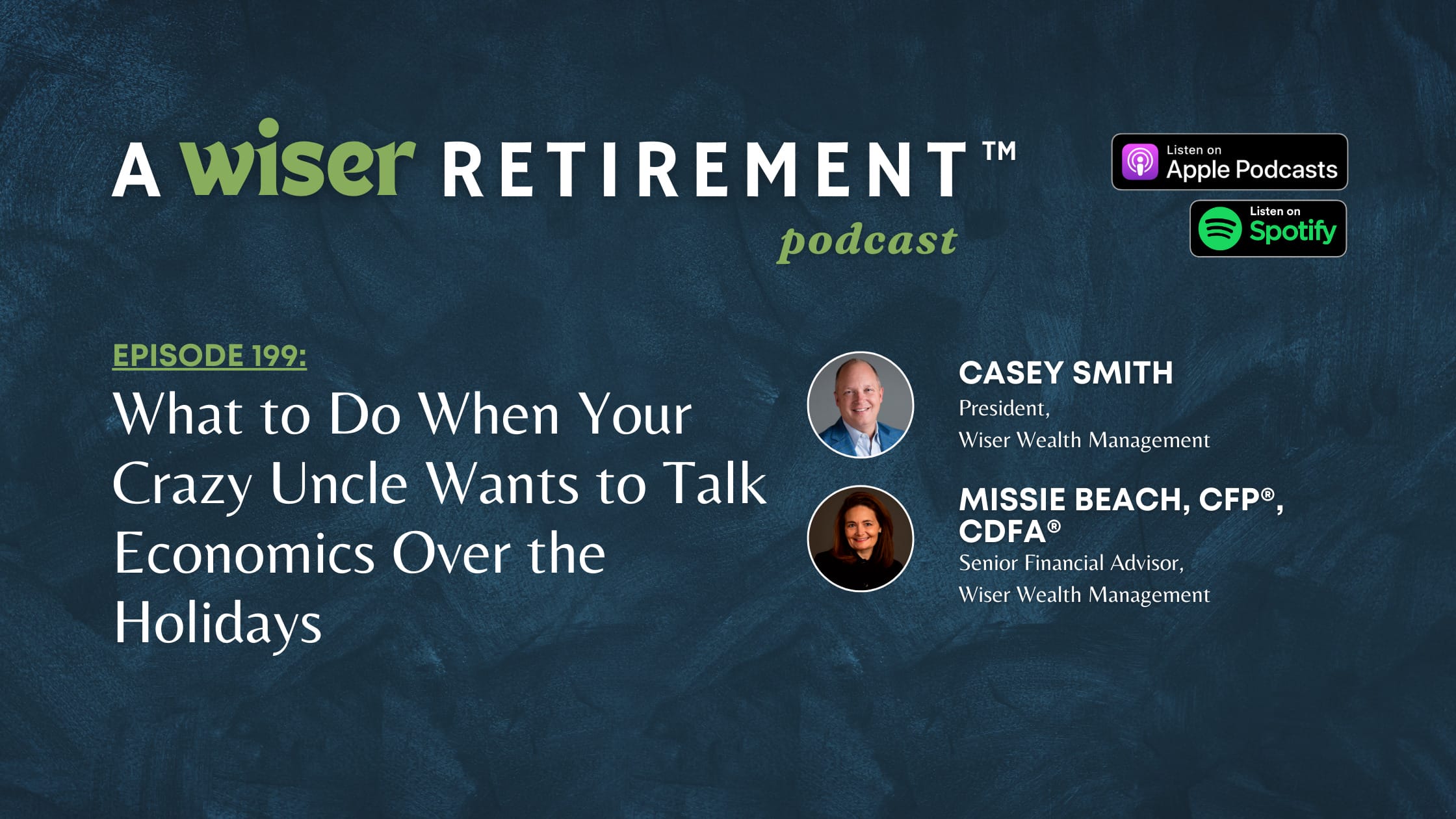
What to Do When Your Crazy Uncle Wants to Talk Economics Over the Holidays
Ever wondered how the economic climate might be shaping your finances and investments? On this episode of A Wiser Retirement™ podcast, Casey Smith and Missie Beach, CFP®, CDFA® talk about the Fed target rate, consumer price index, US GDP, housing, employment rates, and interest rates. They also go over the impact of economic indicators on various sectors.
Listen or Watch on YouTube:
Summary:
The Fed Target Rate is used to lend money out to Banks, and it has gone up by 75% over the last year as the Fed raised interest rates to help cool down the economy. The Consumer Price Index, representing different parts of things that people can purchase, sits at 3.12%, and the US GDP is up by 6%, but still growing at a relatively low rate of 2.15%. Be cautious of believing everything you hear from family members who want to talk about the economy or politics at your holiday gathering. People are often misinformed, and it is important to look at accurate data to determine the current state of the economy. Currently, there are indications of a slowdown in the economy that does not necessarily mean a recession is on the horizon.
Economic Indicators
The 4%-5% annual growth achieved by the Trump Administration has since tapered down to around 2%, which is still considered a bit weak. Other economic indicators, such as manufacturing, personal consumption expenditures, retail sales, and total non-farm payrolls, are showing positive signs. However, there is a slowdown in housing starts and a decreasing trend in new orders from manufacturing. The unemployment rate has fluctuated widely, falling from around 4.4% prior to Covid to 3.7% at the beginning of 2022, but it reached a peak of 14% during the pandemic. While there are some layoffs in the tech sector, the labor market is generally stable, and this trend is unlikely to trigger a recession unless the unemployment rate increases significantly, perhaps to around 5%.
Long-Term Investing in 2024
It is important to ensure that you have no debt and an emergency fund in place before investing. It is also wise to educate yourself by looking back at past investment decisions without emotions to gain perspective on long-term returns. Educate yourself on different investment strategies and take a more informed approach to investing, rather than relying solely on mainstream beliefs and advice. We recommend speaking with a financial advisor prior to making investment decisions.
What defines a recession?
The definition of a recession in the US has changed over time. For foreign countries, a recession is defined as two negative quarters of GDP. However, the US defines a recession as two negative quarters of GDP, also including job loss. Job loss has not always been a factor in determining if the US is in a recession.
Click here to download our eBook on “Buyer Beware: Why do they keep trying to sell you that annuity?”
Connect:
Twitter, Instagram, Facebook, LinkedIn, and YouTube.
Learn more about A Wiser Retirement™ podcast and access previous episodes.
Share This Story, Choose Your Platform!
Wiser Wealth Management, Inc (“Wiser Wealth”) is a registered investment adviser with the U.S. Securities and Exchange Commission (SEC). As a registered investment adviser, Wiser Wealth and its employees are subject to various rules, filings, and requirements. You can visit the SEC’s website here to obtain further information on our firm or investment adviser’s registration.
Wiser Wealth’s website provides general information regarding our business along with access to additional investment related information, various financial calculators, and external / third party links. Material presented on this website is believed to be from reliable sources and is meant for informational purposes only. Wiser Wealth does not endorse or accept responsibility for the content of any third-party website and is not affiliated with any third-party website or social media page. Wiser Wealth does not expressly or implicitly adopt or endorse any of the expressions, opinions or content posted by third party websites or on social media pages. While Wiser Wealth uses reasonable efforts to obtain information from sources it believes to be reliable, we make no representation that the information or opinions contained in our publications are accurate, reliable, or complete.
To the extent that you utilize any financial calculators or links in our website, you acknowledge and understand that the information provided to you should not be construed as personal investment advice from Wiser Wealth or any of its investment professionals. Advice provided by Wiser Wealth is given only within the context of our contractual agreement with the client. Wiser Wealth does not offer legal, accounting or tax advice. Consult your own attorney, accountant, and other professionals for these services.





